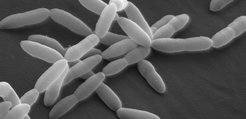Humans and their gut microbes evolved together
Humans migrated out of Africa – and many of our gut microbes came with us. Over the millennia, humans and their microbes have evolved in parallel, and have developed traits to support this co-existence. Researchers at the Max Planck Institute for Biology Tübingen study how gut microbes co-evolved with humans and their impact on our immunity, metabolism, and overall health.

Your gut microbiome is a community of microorganisms that inhabit your digestive system. It encompasses bacteria, viruses, and even the occasional yeast, but exactly which species live there depends on many factors, such as your diet and environment. The microbiome plays a vital role in human digestion and immune health. As a result, it can influence our bodies’ responses to medication, illness, and vaccination.
What is the research at Max Planck Institute for Biology Tübingen about?
To understand the mysteries of the gut microbiome, researchers at Max Planck Institute for Biology Tübingen explore several key aspects:
Co-evolution: Examining how gut microbes have adapted worldwide to different human populations
Disease and immunity: Identifying specific microbes that may indicate disease or predict treatment response
Stability and strain-sharing: Investigating how the same microbial species persist or change in a single person over many years, and how these species are transmitted to others
Bacterial fats (lipids): Understanding how bacteria synthesize key molecules, like lipids, that could influence host metabolism
Digestion: Describing how gut bacteria can affect our digestion, for example via lactose tolerance
The gut microbiome can affect and influence health in many different ways, and can have positive or negative outcomes depending on context. In the end, it's all about balance.



